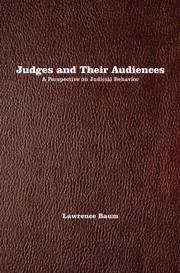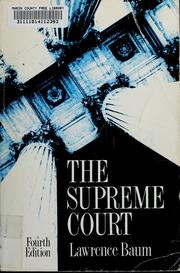| Listing 1 - 10 of 18 | << page >> |
Sort by
|

ISBN: 0871873273 Year: 1985 Publisher: Washington : Congressional Quarterly,
Abstract | Keywords | Export | Availability | Bookmark
 Loading...
Loading...Choose an application
- Reference Manager
- EndNote
- RefWorks (Direct export to RefWorks)

ISBN: 1282423436 9786612423437 0472022636 9780472022632 047208335X 0472106708 9780472083350 9780472106707 0472060708 9780472060702 Year: 1997 Publisher: Ann Arbor University of Michigan Press
Abstract | Keywords | Export | Availability | Bookmark
 Loading...
Loading...Choose an application
- Reference Manager
- EndNote
- RefWorks (Direct export to RefWorks)
How do we explain judges' decisions?
Electronic books. -- local. --- Judicial process -- Psychological aspects. --- Judicial process -- Social aspects. --- Judicial process -- United States. --- Political questions and judicial power -- United States. --- Judicial process --- Political questions and judicial power --- Law - U.S. - General --- Law - U.S. --- Law, Politics & Government --- Decision making, Judicial --- Judicial behavior --- Judicial decision making --- Judges --- Law --- Procedure (Law) --- Judicial activism --- Judicial power and political questions --- Act of state --- Administrative discretion --- Judicial review --- Jurisdiction --- Rule of law --- Separation of powers --- Social aspects --- Psychological aspects --- Interpretation and construction --- Political aspects --- Social aspects. --- Psychological aspects.

ISBN: 9786612086854 1282086855 140082754X 9781400827541 9781282086852 9780691138275 0691138273 0691124930 9780691124933 Year: 2008 Publisher: Oxford Princeton University Press
Abstract | Keywords | Export | Availability | Bookmark
 Loading...
Loading...Choose an application
- Reference Manager
- EndNote
- RefWorks (Direct export to RefWorks)
What motivates judges as decision makers? Political scientist Lawrence Baum offers a new perspective on this crucial question, a perspective based on judges' interest in the approval of audiences important to them. The conventional scholarly wisdom holds that judges on higher courts seek only to make good law, good policy, or both. In these theories, judges are influenced by other people only in limited ways, in consequence of their legal and policy goals. In contrast, Baum argues that the influence of judges' audiences is pervasive. This influence derives from judges' interest in popularity and respect, a motivation central to most people. Judges care about the regard of audiences because they like that regard in itself, not just as a means to other ends. Judges and Their Audiences uses research in social psychology to make the case that audiences shape judges' choices in substantial ways. Drawing on a broad range of scholarship on judicial decision-making and an array of empirical evidence, the book then analyzes the potential and actual impact of several audiences, including the public, other branches of government, court colleagues, the legal profession, and judges' social peers. Engagingly written, this book provides a deeper understanding of key issues concerning judicial behavior on which scholars disagree, identifies aspects of judicial behavior that diverge from the assumptions of existing models, and shows how those models can be strengthened.
Law --- Judicial process --- Judges --- Juridical psychology --- Juristic psychology --- Legal psychology --- Psychology, Juridical --- Psychology, Juristic --- Psychology, Legal --- Psychology, Applied --- Therapeutic jurisprudence --- Psychological aspects. --- Psychology --- Psychological aspects
Book
ISBN: 128305809X 9786613058096 0226039560 Year: 2011 Publisher: Chicago ; London : University of Chicago Press,
Abstract | Keywords | Export | Availability | Bookmark
 Loading...
Loading...Choose an application
- Reference Manager
- EndNote
- RefWorks (Direct export to RefWorks)
Most Americans think that judges should be, and are, generalists who decide a wide array of cases. Nonetheless, we now have specialized courts in many key policy areas. Specializing the Courts provides the first comprehensive analysis of this growing trend toward specialization in the federal and state court systems. Lawrence Baum incisively explores the scope, causes, and consequences of judicial specialization in four areas that include most specialized courts: foreign policy and national security, criminal law, economic issues involving the government, and economic issues in the private sector. Baum examines the process by which court systems in the United States have become increasingly specialized and the motives that have led to the growth of specialization. He also considers the effects of judicial specialization on the work of the courts by demonstrating that under certain conditions, specialization can and does have fundamental effects on the policies that courts make. For this reason, the movement toward greater specialization constitutes a major change in the judiciary.
Judges --- Courts --- economics, government, private sector, criminal law, national security, foreign policy, judicial specialization, legal system, judges, judiciary, politics, political science, removal court, surveillance, intelligence, military justice, overseas courts, progressive era, sanctions, efficiency, litigation, regulation, revenue, expenditures, bankruptcy, business, corporate governance, patents, nonfiction.

ISBN: 0871876191 Year: 1992 Publisher: Washington Outdoor Recreation Resources Review Commission
Abstract | Keywords | Export | Availability | Bookmark
 Loading...
Loading...Choose an application
- Reference Manager
- EndNote
- RefWorks (Direct export to RefWorks)
Book
Abstract | Keywords | Export | Availability | Bookmark
 Loading...
Loading...Choose an application
- Reference Manager
- EndNote
- RefWorks (Direct export to RefWorks)
Book
Abstract | Keywords | Export | Availability | Bookmark
 Loading...
Loading...Choose an application
- Reference Manager
- EndNote
- RefWorks (Direct export to RefWorks)
Book
ISBN: 9781400885367 Year: 2017 Publisher: Princeton, NJ
Abstract | Keywords | Export | Availability | Bookmark
 Loading...
Loading...Choose an application
- Reference Manager
- EndNote
- RefWorks (Direct export to RefWorks)
Book
ISBN: 9780691175522 Year: 2017 Publisher: Princeton : Princeton University Press,
Abstract | Keywords | Export | Availability | Bookmark
 Loading...
Loading...Choose an application
- Reference Manager
- EndNote
- RefWorks (Direct export to RefWorks)
Pouvoir judiciaire --- Droit --- Justice --- Administration --- Etats-Unis
Book
ISBN: 9781071901717 1071901710 Year: 2024 Publisher: Thousand Oaks, California Sage/CQ Press
Abstract | Keywords | Export | Availability | Bookmark
 Loading...
Loading...Choose an application
- Reference Manager
- EndNote
- RefWorks (Direct export to RefWorks)
"In The Supreme Court, Lawrence Baum provides a brief yet comprehensive introduction to the U.S. Supreme Court, one that is balanced and illuminating. In successive chapters, the book examines each major aspect of the Court: the selection, backgrounds, and departures of justices; the creation of the Court's agenda; the decision-making process and the factors that shape the Court's decisions; the substance of the Court's policies; and the Court's impact on government and American society. Describing the Court's personalities and procedures, and delving deeply to explain the actions of the Court and the behavior of justices, Baum shows students the Court's complexity and reach. Tables and figures, plus a lively photo program, make this one of the most engaging books available. It is simply the standard"--
Constitutional law --- Courts of last resort --- Judicial review --- United States.
| Listing 1 - 10 of 18 | << page >> |
Sort by
|

 Search
Search Feedback
Feedback About UniCat
About UniCat  Help
Help News
News